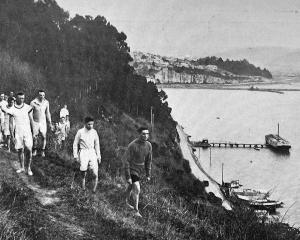With each separate set of bones he found a collection of pebbles, mostly worn and rounded quartz stones, which are commonly regarded as gizzard stones. He says that it was impossible to go far without seeing some of the bones, and that there must have been many cartloads of them. In only one instance he found evidence that the bird had not died a natural death.
The evidence was a blade-shaped piece of broken flint about three and a-half or four inches long. It was thin and sharp, and was well adapted for use in cutting flesh. The correspondent has never heard of moa bones so plentiful, so exposed, or so perfect as those he saw at Alexandra. He was there from June to December. During that time there was only one flying shower, not sufficient to wet a person on the open plain.
The dryness of the soil, he believes, has a tendency to preserve animal remains, and he thinks that this, together with the sandy, porous soil, may account for the extraordinary deposits of bones in the district. In regard to the theory that large numbers of moas were destroyed in forest fires, he says that a gigantic bird like the moa could not have lived in any New Zealand forest he has found his way out of, as the trees are too close together and the undergrowth is too dense to enable them to get about.
He does not think that the moas could have been driven from one side of the Clutha to the other where the bones were deposited, as the river is swift, deep, and broad. The flat upon which he made his discoveries, he adds, might be under cultivation now, but he thinks that it is worth while to collect and record any information that can still be obtained from the locality.
• Large quantities of fish - chiefly groper, kingfish and barracouta - have been taken by the Port Chalmers fishermen during the past few days. The last-mentioned are very plentiful at present, and some large hauls were made by the fishermen in the vicinity of Cape Saunders yesterday, when most of the boats returned to port deeply laden with them. Some of the boats secured 40 or 50 dozen barracouta apiece, the result being a marked slump in prices.
The ruling price for that variety of fish in large quantities is 1s 6d per dozen, at which price a large number were reported to have been purchased yesterday, presumably for freezing. Kingfish and hapuka have not been quite so plentiful during the past few days as they were some time ago, and for both varieties buyers were charged 1s 6d apiece at the fish landing.
• A young man, son of Mr John M'Neil, of Waimate Island, was the other day gathering mussels in the sea close to the shore on one of the islands in the gulf (says our Auckland correspondent), when his father was attracted by the boy's cries for help.
On arriving to see what was the matter, Mr M'Neil found that an octopus had one of its tentacles, which was as big as a man's wrist, wound round the boy's leg. The creature had so strong a hold of the lad that it drew blood before they could be separated. But for the timely arrival of the father it would have gone hard with the boy.
- ODT, 28.1.1913.












